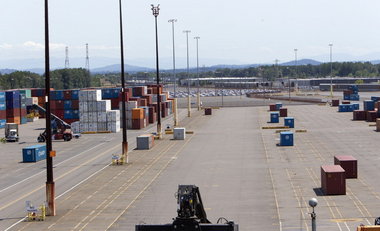forum
library
tutorial
contact

Port of Portland Longshore Union Intentionally
Slowed Work at Terminal 6, NLRB Judge Rules
by Joseph Rose
The Oregonian, May 31, 2014
|
the film forum library tutorial contact |

|
Port of Portland Longshore Union Intentionally
by Joseph Rose
|
 In a blow to the longshoreman union's lengthy showdown with the Port of Portland, a National Labor Relations Board judge found the International Longshore and Warehouse Union guilty of intentional slowdowns at North Portland's crucial Terminal 6.
In a blow to the longshoreman union's lengthy showdown with the Port of Portland, a National Labor Relations Board judge found the International Longshore and Warehouse Union guilty of intentional slowdowns at North Portland's crucial Terminal 6.
The 18-page decision, (PDF) written by administrative law judge Jeffrey D. Wedekind in San Francisco, orders ILWU and its Local 8 and Local 40 affiliates in Portland "to cease and desist from engaging in such unlawful secondary conduct."
There's ample evidence that the intentional slowdowns occurred between September 2012 and June 2013, Wedekind ruled.
For two years, the ILWU, which loads and unloads cargo at port terminals, has been engaged in increasingly nasty disputes with ICTSI Oregon, the Philippine-owned conglomerate that operates Terminal 6 for the Port under a 25-year lease.
In recent years, the Port has become concerned about the pace of work at Oregon's only deep-draft container yard. Slow work, labor disputes and cargo-handling interruptions have backed up trucks, delayed and rerouted ships, spawned lawsuits and almost persuaded Hanjin Shipping Co. to end its weekly Portland vessel calls.
The ILWU has refused to cooperate with Gov. John Kitzhaber's analysis of the situation at the container terminal, calling it a "sham."
In February, the Port began an incentive program offering extra payments -- capped at $4 million a year -- to container carriers who continue to send ships to Portland. The compensation package, the third in as many years, is intended to offset concerns about slow turnaround times by Hanjin and other shipping companies.
The union has long blamed business decisions by ICTSI, noting that it has no motive to make operations less efficient.
"Poor productivity means that ICTSI must order more gangs to work the vessels that call on Terminal 6, which results in much higher labor costs," ICTSI Oregon Chief Executive Officer Elvis Ganda wrote in an email to The Oregonian earlier this year.
The NLRB's 40 administrative law judges hear, settle and decide unfair labor practice cases nationwide.
Wedekind found plenty of evidence that the ILWU and Local 8 encouraged longshoremen "to unnecessarily operate cranes and drive trucks in a slow and nonproductive manner, refuse to hoist cranes in bypass mode, and refuse to move two 20-foot containers at a time on older carts, in order to force or require ICTSI and carriers who call at terminal 6 to cease doing business with the Port."
Among other things, the dispute involves who should be plugging, unplugging and monitoring refrigerated containers after they are unloaded from vessels at Terminal 6, Wedekind wrote.
The union contends that the work should be assigned to the Local 8 longshoremen rather than electricians directly employed by the Port and represented by the International Brotherhood of Electrical Workers Local 48.
According to the ruling, James Mullen, ICTSI's director of labor relations and terminal services (and a former terminal manager), testified that he saw Local 8 crane operators "working unnecessarily slowly."
In September 2012, after observing two crane operators operating slowly for two days in a row, Mullen reviewed the supercargo logs for the shifts. They showed that both union workers performed only about 15 net container moves per hour, far below normal.
The judge also found Mullen credible when he testified that he "witnessed an incident in late 2012 when most of the Local 8 truck drivers on two gangs were taking the 'scenic route' around the yard and leaving the crane hook hanging for no apparent reason."
Many of the drivers refused to comply with a foreman's order to take the direct route until after they were threatened dismissal, the documents show.
Wedekind cited several other pieces of evidence pointing to deliberate slowdowns at the busy port, from radio conversations and clerks declining to schedule certain work to truck drivers refusing to move more than one 20-foot container at a time on older trailers.
Steven Cox, a Local 8 crane operator, admitted that he and other longshoremen "did not work as productively during the relevant period because they and the Local Unions refused to 'babysit' or 'take care of the company' anymore," the ruling states.
Wedekind said his ruling could lead to contempt sanctions against the union.
The ILWU has not responded to the ruling, which is the second of its kind in recent months.
learn more on topics covered in the film
see the video
read the script
learn the songs
discussion forum
